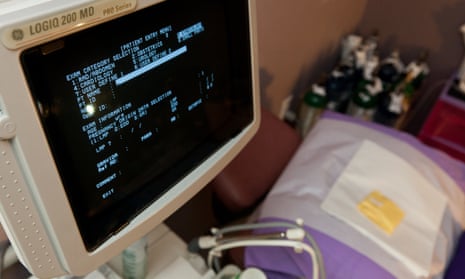A bill to outlaw abortions based on sex or race that Democratic lawmakers and advocates have called a “nightmare” made its way to the US House of Representatives committee floor late on Thursday, where Republicans invoked Frederick Douglass, the Book of Matthew and Thomas Jefferson in arguing that abortions they believe to be discriminatory should be criminalized.
“It took the civil war to make the state-sanctioned practice of human slavery come to an end,” said Representative Trent Franks, the bill’s sponsor, at a House judiciary subcommittee hearing on Thursday. He said that while the US has “made great progress” in the advancement of civil rights and bringing an end to racial discrimination, “one glaring exception is life itself, the most foundational civil right of all”.
The Prenatal Discrimination Act (Prenda) seeks to make it illegal to have an abortion based on the sex or race of the fetus. But advocates argued the proposal would force physicians to report on patients they suspect of having an abortion for those reasons without having any real way of knowing. They warn it would also effectively institutionalize racial profiling on the part of doctors and violate the physician-patient relationship.
“This bill is so horrendous that I could not believe it when it was first brought up,” said Representative Judy Chu of California. “It is a nightmare. This is a piece of legislation that would impose criminal penalties on providers and limit the reproductive choices of women of color and all women.”
She said providers facing the possibility of jail time for failing to report on minority women having abortions as a catch-all, and worried that it could also further discourage physicians from serving underrepresented communities.
Chu also pointed out that the committee is composed entirely of men.
“It’s so upside-down,” Chu said. “This shows that this is a male-dominated effort and actually points to the fact that there are men who are trying to stop choice for women.”
“This bill is bad on so many levels, the most obvious being that this is garnering a hearing in the subcommittee on the constitution and this is clearly unconstitutional,” says Miriam Yeung, the executive director of the National Asian Pacific American Women’s Forum (NAPAWF) and the only pro-choice witness called to testify before the committee. “This bill was created specifically to challenge Roe v Wade through creating a pre-viability reason to ban abortion. It’s extra horrible to do so under the pretense of trying to eliminate racial and gender discrimination when this is very discriminating against women of color.”
According to Yeung, the University of Chicago report Replacing Myths with Facts found that one of the top myths used in support of abortion bans, and especially sex and race discrimination abortion bans, is that Asian American women are more likely to abort a fetus if they know it is female, a mental trick of applying the historic effects of China’s one-child policy on the lives of women of Asian descent. Yeung says the data finds just the opposite: Asian American women give birth to more girls in the US than white women.
“They are blanketing our community using xenophobic stereotypes with what’s happening in India and China,” said Yeung. “In some states [that have passed such bans on the state level], in the testimonies you’ll hear legislators on record saying: ‘We have to stop that from happening here. They are bringing those values to our country and we have to stop it.’ This is old-fashioned ‘yellow fear’, but not based on reality or fact.”
Yeung adds that even a woman’s off-handed comment to her healthcare provider, such as “I hope I have a boy one day”, could force the provider under the bill to “turn into a police person”.
Monica Simpson, the executive director of SisterSong, the National Women of Color Reproductive Justice Collective, said Prenda is a targeted measure to devalue black lives.
“What we see now is legislation like this, co-opting the notion that race is such a serious issue in this country and trying to spin it in a way that benefits a very specific legislative agenda is just wrong,” said Simpson. “These kinds of anti-choicers, or pro-birthers as I like to call them, don’t care about the conditions of our lives like the schools we’re going to, the food we are eating, the environment we are living in.”
Representative Steve Cohen of Tennessee said at the hearing he was “disturbed” that the hearing on Prenda was even being held, calling it an “assault on women’s right to choose and has nothing to do with discrimination on race or sex”.
The Democratic congressman commented that the south is especially good at three things: “barbecue, football and thwarting a person’s opportunity to vote”. Cohen said that he wished the judiciary committee were instead spending its time on expanding voting rights, ensuring equal pay for women and finding ways to make childcare accessible so that more women could engage in the workforce. These, he said, were the real ways to cut down the rate of abortion in the African American community.
Simpson added that the bill is a purported solution looking for a problem.
“If you ask a black woman if she has had an abortion because her child is black, she will say that’s absolutely insane. She would instead talk about her economic state, her access to healthcare, whether she might be in a violent relationship,” Simpson says. “Our elected officials are supposed to be in office to move forward legislation to make us healthier and better, but I’m seeing the opposite. So it makes me question a lot of things, especially as a black woman living in this country. With bills like this, it becomes more and more obvious that my life doesn’t matter and that’s disheartening and hard to hold as a person who has to walk in this world every day.”
